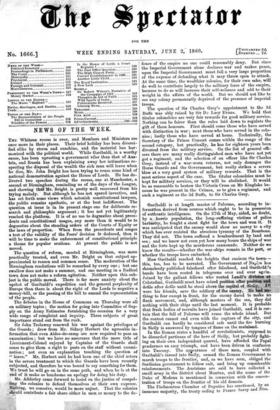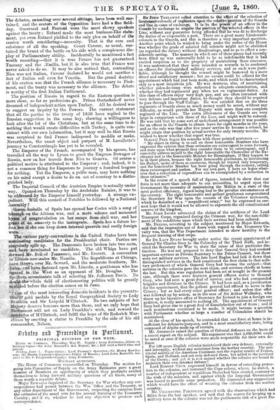Garibaldi is at length master of Palermo, according to in-
formation derived from sources whioh ought to be in possession of authentic intelligence. On the 27th of May, aided, no doubt, by a- ..heroie population, the long-suffering victims of police barbiii.lty, he fought a stout fight for the town and won it. It was anticipated that the enemy would show no mercy to a city which has ever resisted the atrocious tyranny of the Bourbons. They did not. The town suffered a bombardment by land and sea ; and we know not even yet how many hours the ships of war and the forts kept up the murderous cannonade. Neither do we know the results—whether the war-ships remain in the pork 'or
whether the troops have embarked. •
How Garibaldi reached the heights that encircle the town-- this, too, has to be narrated. The Government of Nailas has shamelessly published falsehood after falsehood, and GaribalcVs bands have been routed in telegrams over and over again. Joined by the gallant fellows who routed Land's division at Calatafimi, Garibaldi must have seized position after position and defile after defile until he stood above the capital of Sicily, All were his friends, save the soldiery of the enemy. He had rico_ thing to fear except in front, for the enemy dared to make no flank movement, and, although masters of the sea, they did nothing with their ships until the last moment. It is probable that fresh bodies of recruits have joined Garibaldi, and it is cer- tain that the fall of Palermo will rouse the whole island. But the contest cannot end even with the capture of the city, and Garibaldi can hardly be considered safe until the fire burning in Sicily is answered by tongues of flame on the mainland.
In the Roman states a handful of revolutionists, supposed to be discarded partisans of the hero of Sicily, but probably fight- ing on their own independent quarrel, have afforded the Papal gendarmes an easy triumph, and have been driven in confusion into Tuscany. The appearance of these men, coupled with GaribaMi's inroad into Sicily, caused the Roman Government to
march troops to the frontier, and, as we have seen, obliged the Sardinian government to follow suit, and bring up considerable reinforcements. The Austrians are said to have collected a small army in the district about Mantua, and the name of the Duke of Modena is mentioned in connexion with the concen- tration of troops on the frontier of his old domain.
The Piedmontese Chamber of Deputies has sanctioned, by an immense majority, the treaty ceding to France Savoy and Nice.
The debates, extending over several sittings, have been well sus- tained, and the orators of the Opposition have had a fine field- day. Guerrazzi and Fantoni were the most showy speakers against the treaty ; Ratazzi made the most business-like state- ment, yet even Ratazzi yielded to the only plea on behalf of the cession worth considering—necessity. That is the sum and substance of all the speaking. Count Cavonr, as usual, sus- tained the brunt of the battle on his side with a conspicuous dis- play of Parliamentary ability. Incidentally be mentioned a fact worth recording—that it is true France has not guaranteed Tuscany and the "Emilia, but it is also true that France was never asked to do so. It may be also noticed that, contending Nice was not Italian, Cavour declared be would not sacrifice a foot of Italian soil even for Venetia. But the grand doctrine of his oration was that the French alliance is necessary to Pied- mont, and the treaty was necessary to the alliance. The debate is worthy of the first Italian Parliament.
The position of Russia in regard to the Eastern question is more dear, so far as professions go. Prince Gortschakoff never dreamed of independent action upon Turkey. All he desired was to suggest an inquiry by the Powers. The current statement that all the parties to the treaty of 1856 have replied to the Russian suggestion in the same key, showing a willingness to look after the lot of the Christians, but at the same time to do nothing that would create difficulties with Turkey, is quite con- sistent with our own information, but it may well be that Russia was surprised to find France indisposed to meddle or make. Nevertheless, the exact object and purport of M. Lavallette's journey to Constantinople has yet to be revealed.
The Emperor of the French, accompanied by his spouse, has travelled all the way to Lyons to greet the Empress Dowager of Russia, now on her travels from Nice to Geneva. Of course a political motive is attributed to the Emperor ; and, indeed, it is not a common thing for Emperors to journey a hundred leagues for nothing. Yet the Emperor, a polite man, may have nothing on his mind except a desire to do an act of courtesy to a distin- guished lady.
The Imperial Council of the Austrian Empire is actually under way. Opened-on Thursday by the Archduke Rainier, it was to be addressed by the Emperor himself yesterday. A strange ex- pedient. Will this council of Notables be followed by a National Assembly ?
Queen Isabella of Spain has opened her Cortes with a song of triumph on the African war, and a more solemn and measured hymn of congratulation on her escape from civil war, and her grant of an amnesty to the insurgents. Spain has a future be- e her if she can keep clown internal quarrels and costly foreign
wars.
The various party-conventions in the 'United States have been nominating candidates for the Presidential chair. Parties are singularly split up. The Democrats have broken into two sects, and have nominated no candidate. The old Whigs have put forward Mr. Bell of Tennessee, and Mr. Everett. A convention in Illinois notrunates Mr. Hamlin. The Republicans at Chicago, i.r.ve throw:, over Mr. Seward, and the moderate Southern, Mr. Bates,. r.nd have fastened upon Mr. Lincoln, a gentleman who has figured in the West as an opponent of Mr. Douglas. The Scalthern secessionists talk of selecting Mr. Jefferson Davis. No douht the•whole field of electioneering politics will be greatly njoclified before the election comes on in June.



























